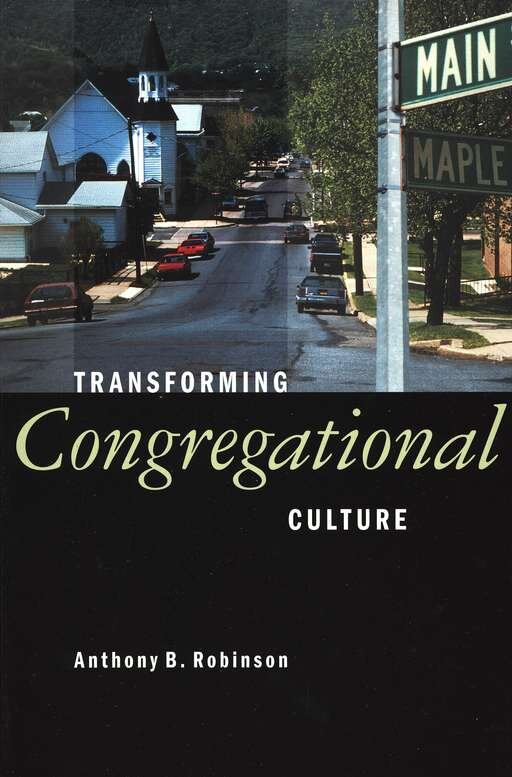Anthony B. Robinson, Transforming Congregational Culture. Eerdmans, 2003.
Sequel: Robinson, Changing the Conversation
Referenced in:
- Leadership Approaches – Adaptive Leadership
- Strategies for Congregational Renewal: Diagnostic/Prescriptive
LifeandLeadership.com Summary
This is a best-selling volume on church renewal. It is often recommended alongside Robinson’s sequel, Changing the Conversation. While written with the concerns of mainline Protestant denominations in mind, the insights are transferrable to congregations of various Christian faith traditions.
Robinson begins by chronicling the major cultural shifts of the last several decades, and how these have affected the way churches function. Here he uses one of the common leadership metaphors of Ron Heifetz, that successful church leaders must shift from technical leadership to engage the more challenging adaptive work. Applied to the context of church leadership, Robinson describes technical work as management of the well-defined issues of congregations that are in continuity with their environment. Images come to mind such as providing answers, protecting, orienting, quelling conflict – more the role of the pastor and priest. Adaptive work, on the other hand, is recognizing the growing discontinuity of churches, as well as all social institutions, in the post-Christendom era, and then asking probing questions, letting people feel the pinch of reality, dis-orienting, drawing out conflict, challenging norms – more the work of the prophet. Congregations need both types of leadership, and leaders understandably gravitate to the technical side when churches perceive themselves to be in more stable environments. Even in the midst of the current instability, there
are such powerful forces in the church and culture pushing pastors toward more congenial roles of peacemaker, reconciler, smoother of ruffled feathers, and but another of the helping professions – trying to make life a little easier, a little less stressful. (22)
For these reasons and others, adaptive leadership is not easy and is seldom well received. But, as he says,
To bring about change in the culture of congregations will require just such loving, gutsy, bold leadership. Never to challenge, question, disorient, or lead people onto the risky terrain of conflict can hardly be called leadership. It may be a fine institutional chaplaincy, but it is not pastoral leadership. In reality, that is avoiding leadership rather than exercising it. It more effectively keeps people dependent than it helps them to grow into a mature Christian faith and life. (24)
Armed with this philosophy, Robinson calls church leaders to the adventurous challenge of reshaping the culture of their congregations in Eight Significant Directions:
- From civic faith to human transformation
- From assuming the goods to delivering the goods
- From a congregational spirituality of givers to receivers who give
- From board culture to ministry culture
- From community organization to faith-based ministry
- From democracy to discernment
- From a budget viewed as ends to that of means
- From fellowship to hospitality
Church leaders of all traditions who recognize their congregations are deeply entrenched in the status quo will find rich resources for renewal in this volume. It is certainly conveyed in the language and assumptions of liberal mainline denominations, a point of identification with some and not with others. That said, it is an excellent description of the kind of deep change established congregations must experience in the new era.
From the Publisher
Many recent books have attempted to address the “crisis” in the mainline church. Anthony Robinson here makes a significant — and in many ways unique — contribution to this discussion by bringing his personal insights as a pastor to bear on the issue of renewing congregational life.
Writing from twenty-five years of experience in four congregations of differing size, location, and ethnic makeup, Robinson prescribes concrete changes in the practice of ministry that have been tried, tested, and lived out to great success. At the heart of his framework for church renewal is what he calls “cultural change.” According to Robinson, technical or programmatic change is not sufficient to address the needs of the day. He argues for changing the very culture of mainline congregations, which involves recognizing and fostering their particular gifts and genius rather than trying to remake them into something they are not. His fruitful strategies for renewal touch every aspect of congregational life, from personal spiritual formation to church leadership.
About the Author
Anthony B. Robinson currently teaches congregational leadership studies at Emmanuel College in Toronto. He is president of the Seattle-based Congregational Leadership Northwest and the author of nine books, including the award-winning What’s Theology Got to Do with It?
***For additional information on this resource, including reviews, click the bookstore links. Check the reference at page top or the links below for resource guides on related topics.***
See Resources on Over 100 Areas of Ministry Leadership:


